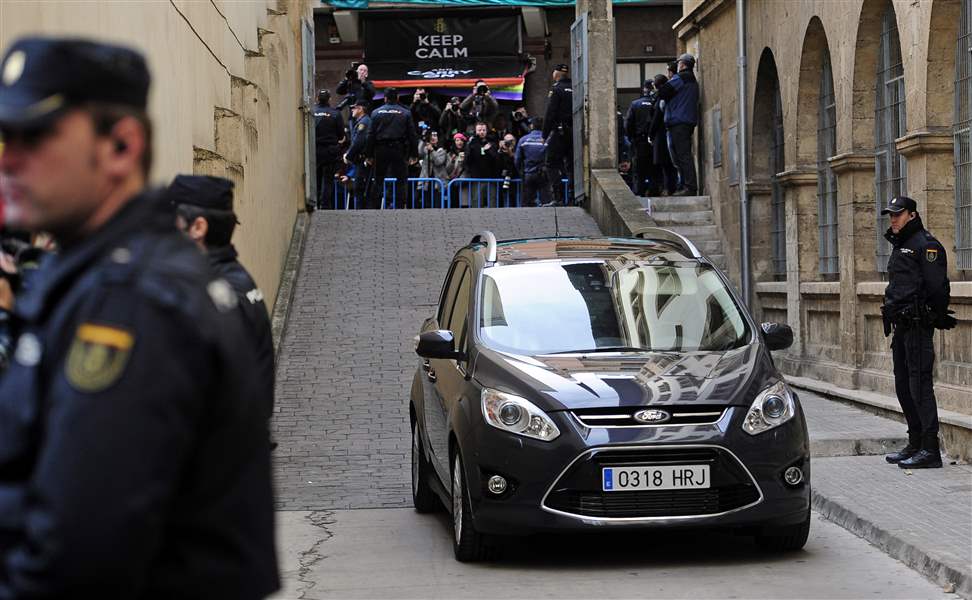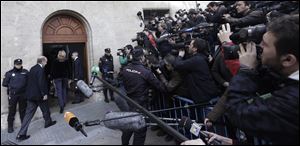
Spain's Princess Cristina goes to court in historic hearing on fraud, money laundering case
2/8/2014
A car carrying Spain's Princess Cristina arrives at the courthouse in Palma de Mallorca, Spain, Saturday, Feb. 8, 2014. The Spanish princess headed into court on Saturday for a historic judicial hearing to help determine whether she and her husband illegally used funds from a company to pay for expenses, including expensive parties at their modernist Barcelona mansion. Princess Cristina faces questioning by investigating Judge Jose Castro who has named her as a fraud and money laundering suspect. (AP Photo/Manu Fernandez)
ASSOCIATED PRESS

Spain's Princess Cristina, third from left, enters the courthouse Saturday in Palma de Mallorca, Spain.
PALMA DE MALLORCA, Spain — Spain’s Princess Cristina headed into court Saturday to testify in a historic judicial hearing aimed at helping determine whether she and her husband illegally used company funds for personal expenses, including lavish parties at their modernist Barcelona mansion.
Hundreds of protesters blew shrieking whistles, revved motorcycle engines, honked car horns and chanted “Out with the Spanish crown” just 100 yards from the side entrance of the courthouse where Cristina was dropped off in a modest Ford C-Max hatchback and filmed by a media horde.
A mystery over whether she would decide to walk about 50 paces down an alley leading to the entrance in a Spanish version of a “perp walk” ended when the car drove down the alley instead. Cristina took a dozen steps to get inside, looking briefly toward the cameras with a smile and giving a two-word greeting: “Buenos dias” ("good morning").
Cristina, the first Spanish royal to be questioned in court since the monarchy was restored in 1975, faced Judge Jose Castro, who has summoned her as a fraud and money laundering suspect. Saturday’s closed-door session is a key step in determining whether she will be charged.
The legal troubles of King Juan Carlos’ youngest daughter have seriously damaged the image of Spain’s monarchy at a time of 26 percent unemployment, outrage over political corruption, unpopular tax hikes and cutbacks to cherished government programs.
Cristina was to answer questions from a high-backed chair directly facing Castro. A picture of her father — Spain’s head of state — mounted on the wall behind the judge.
The use, or suspected abuse, of company funds to cover household expenses for her Barcelona mansion is among the evidence Castro has compiled about Aizoon, the real estate and consulting firm that Cristina owned with her husband, Olympic handball medalist turned businessman Inaki Urdangarin. Castro has referred to Aizoon in court paperwork as a “front company.”
Castro says in court records that many company expenses that appear personal in nature were never declared on the couple’s income tax returns, and that he must determine whether the amounts spent reach an annual value of more than $163,630 that could turn the non-reporting into a crime punishable by prison.
If the amounts are less, the likely result would be an administrative tax investigation and possible fines.
The case stems directly from another one led by the same judge where he is investigating Urdangarin for allegedly using his position as the Duke of Palma to embezzle public contracts via the Noos Institute, a supposedly nonprofit foundation he and a business partner set up that channeled money to other businesses, including Aizoon.
Court paperwork shows that Castro is keen to clear up uncertainty about 1.2 million euros that may have been transferred from Noos to Aizoon.
The 48-year-old princess, a bank foundation director known for her love of skiing and sailing, has been cleared of involvement in Noos.
Spain’s royal family is eager to have the case — that has dragged on for years — to end rapidly so it can try to rebuild the trust it once had, Spanish royalty watchers say.
The monarchy enjoyed high esteem for decades because Juan Carlos played a strong role in the transition from dictatorship to democracy.
But now it is tarnished by a combination of the princess’ legal woes and the king’s own catastrophic decision to go on an expensive elephant hunting safari in 2012 — just as the nation teetered on the edge of financial chaos during Europe’s debt crisis.